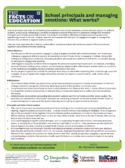School principals and managing emotions: What works?
Download the Fact Sheet (1.13 MB / pdf)
DownloadHow can principals and other school leaders practise effective instructional leadership, provide adequate support for staff and students, pursue equity-related goals, and build collaborative cultures if they lack the capacity to manage their emotions? Principals’ work is highly emotionally charged. The ability for principals to effectively manage emotions is paramount to experiencing success in the role. However, even the most experienced principals can engage in strategies to manage their emotions that are linked to negative health outcomes.
There are many ways that school districts, policymakers, and even principals themselves can support effective emotional regulation and promote emotional wellbeing.
School Districts:
- Provide opportunities for principals to engage in coping strategies associated with positive outcomes, such as talking to colleagues, engaging in reflective practice, and spending time with friends, family, or engaging in hobbies. Sharing their feelings and talking about emotionally challenging situations with people who understand their work is an effective strategy for principals to manage their emotions.
- Limit triggers or suppress conditions that can heighten the emotional aspects of principals’ work. For example, intensifying workload demands, shifting policy contexts, and encountering resistance when advocating for student needs can contribute to the emotionally challenging situations principals experience in their work.
- Ensure adequate supports are available for principals when they are tasked with shepherding their school through crises and tragedies, as school leaders often neglect themselves and their own needs to support students, staff, and the school community.
Policymakers:
- Use current professional learning opportunities and principal preparation programs to expose school leaders to skills and strategies needed to manage the emotionally challenging aspects of their position in productive ways.
- Give principals and others school leaders a voice in policy decisions that influence their work. It can be difficult for principals to manage their emotions when policies or initiatives they are tasked with implementing conflict with their educational philosophy.
- Initiate broader conversations surrounding what education systems need from principals and other school leaders. The expansion and intensification of principals’ workloads are concerning as they will not be able to maximize their impact on student achievement or operate at full capacity when they are struggling to juggle competing demands.
Principals and Other School Leaders:
- Take control of your work by scheduling dedicated time to do things at the school that you find personally fulfilling and inspiring. Negative situations are bound to arise – a certain amount of stress in the workday is inevitable. Try to arrange your day so that you sandwich those negative interactions between positive experiences. For instance, if you know you have a difficult meeting, schedule it before lunch, so that you have a built-in break, rather than at the end of the day, when you are likely to take that stress home with you.
- Try to avoid engaging in negative coping strategies, such as suppressing thoughts and emotions, ruminating about past events, or worrying about future situations over which you have little or no control. These behaviours are associated with several negative outcomes, including increased levels of stress, emotional exhaustion, and burnout.
- It is important to take care of yourself. Even the most effective principals can become reactive and make poor decisions when they feel emotionally drained or burnt out. For example, binge watching television while eating junk food can provide a distraction from negative emotions but can easily become a bad habit. Getting enough sleep, engaging in regular exercise, and participating in activities that promote a healthy work-life balance are positive and proactive strategies for managing one’s emotions.
Additional information and resources
References
Berkovich, I., & Eyal, O. (2015). Educational leaders and emotions: An international review of empirical evidence 1992–2012. Review of Educational Research, 85(1), 129–167. doi: 10.3102/0034654314550046
Gross, J. J. (2013). Emotion regulation: Taking stock and moving forward. Emotion, 13(3), 359–365. doi: 10.1037/a0032135
Hauseman, C. (2021). Strategies secondary school principals use to manage their emotions. Leadership and Policy in Schools, 20(4), 630–649. doi: 10.1080/15700763.2020.1734211
Hauseman, C. (2020a). How workload influences the emotional aspects of principals’ work. Educational Leadership in Action, 6(2), 1–30.
Hauseman, C. (2020b). Managing emotions and coping in a context of work intensification. Canadian Journal of Educational Administration and Policy, 192, 42–51.
Haver, A., Akerjordet, K., & Furunes, T. (2013). Emotion regulation and its implications for leadership: An integrative review and future research agenda. Journal of Leadership & Organizational Studies, 20(3), 287–303. doi:10.1177/1548051813485438
Poirel, E., & Yvon, F. (2014). School principal’s emotional coping process. Canadian Journal of Education, 37(3), 1–23.
Schmidt, M. J. (2010). Is there a place for emotions within leadership preparation programmes? Journal of Educational Administration, 48(5), 626–641.
Yamamoto, J. K., Gardiner, M. E., & Tenuto, P. L. (2014). Emotion in leadership: Secondary school administrators’ perceptions of critical incidents. Educational Management Administration and Leadership, 42(2), 165–183. doi: 10.1177/1741143213499260
Zembylas, M. (2010). The emotional aspects of leadership for social justice: Implications for leadership preparation programs. Journal of Educational Administration, 48(5), 611–625. doi: 10.1108/09578231011067767

